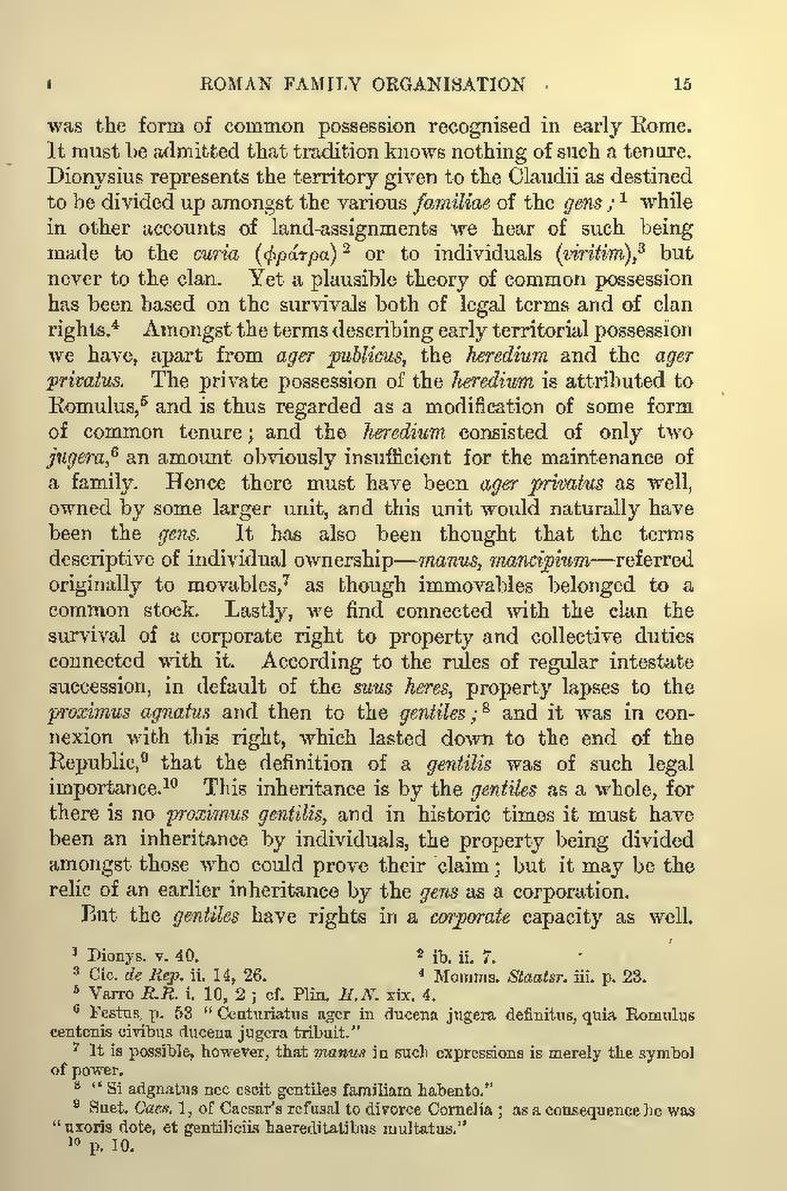was the form of common possession recognised in early Rome. It must be admitted that tradition knows nothing of such a tenure. Dionysius represents the territory given to the Claudii as destined to be divided up amongst the various familiae of the gens;[1] while in other accounts of land-assignments we hear of such being made to the curia ([Greek: phratra])[2] or to individuals (viritim),[3] but never to the clan. Yet a plausible theory of common possession has been based on the survivals both of legal terms and of clan rights.[4] Amongst the terms describing early territorial possession we have, apart from ager publicus, the heredium and the ager privatus. The private possession of the heredium is attributed to Romulus,[5] and is thus regarded as a modification of some form of common tenure; and the heredium consisted of only two jugera,[6] an amount obviously insufficient for the maintenance of a family. Hence there must have been ager privatus as well, owned by some larger unit, and this unit would naturally have been the gens. It has also been thought that the terms descriptive of individual ownership—manus, mancipium—referred originally to movables,[7] as though immovables belonged to a common stock. Lastly, we find connected with the clan the survival of a corporate right to property and collective duties connected with it. According to the rules of regular intestate succession, in default of the suus heres, property lapses to the proximus agnatus and then to the gentiles;[8] and it was in connexion with this right, which lasted down to the end of the Republic,[9] that the definition of a gentilis was of such legal importance.[10] This inheritance is by the gentiles as a whole, for there is no proximus gentilis, and in historic times it must have been an inheritance by individuals, the property being divided amongst those who could prove their claim; but it may be the relic of an earlier inheritance by the gens as a corporation.
But the gentiles have rights in a corporate capacity as well.
- ↑ Dionys. v. 40.
- ↑ ib. ii. 7.
- ↑ Cic. de Rep. ii. 14, 26.
- ↑ Momms. Staatsr. iii. p. 23.
- ↑ Varro R.R. i. 10, 2; cf. Plin. H.N. xix. 4.
- ↑ Festus p. 53 "Centuriatus ager in ducena jugera definitus, quia Romulus centenis civibus ducena jugera tribuit."
- ↑ It is possible, however, that manus in such expressions is merely the symbol of power.
- ↑ "Si adgnatus nec escit gentiles familiam habento."
- ↑ Suet. Caes. 1, of Caesar's refusal to divorce Cornelia; as a consequence he was "uxoris dote, et gentiliciis haereditatibus multatus."
